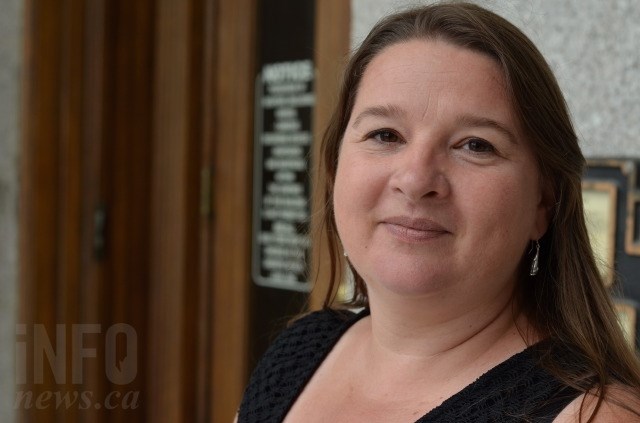
Vernon defence lawyer Claire Mastop.
(CHARLOTTE HELSTON / iNFOnews.ca)
July 20, 2016 - 10:33 AM
VERNON - A Vernon defence lawyer who’s helped a great number of addicts and mentally unstable individuals through the criminal justice system says many are slipping through the cracks and falling back behind bars simply because there is not enough help for them in the community.
Claire Mastop has seen clients thrown back in jail because there was no bed available for them at the treatment centre, or because they were stuck on a waiting list for rehab, leading them to relapse in the interim and end up breaching court conditions.
“Any little obstacle that comes up — and it doesn’t take much — will stymie those efforts (at rehab) and so I end up seeing them over and over again,” Mastop says.
The bulk of Mastop’s clients retain her services through legal aid, and many suffer from combinations of mental health issues, addiction and homelessness.
“Most of my clients, I have to wait for them to contact me or appear in court because they don’t have phones, they don’t have a permanent address,” Mastop says. “Rarely are my clients people who came through a trouble free childhood. A lot who’ve been in foster care, a lot who started drinking or doing drugs at a very early age. It’s extremely rare that my legal aid clients have completed high school.”
Mastop often asks judges to consider a rehabilitative sentence — one that involves therapy, counselling and treatment in place of a jail term — but is left frustrated when clients are set up for failure because they can’t get the help they need, when they need it.
Of all the examples, and there are many, one stands out in particular. A client trying to get into a mother and babies addictions program out of Kelowna was stuck on a waiting list for months.
“She ends up miscarrying, and the trauma from the miscarriage makes her relapse hard and she ends up back in jail. Would she have been successful in treatment? I have no way of knowing. Would she have been able to keep that baby? Maybe, but the possibility is gone,” Mastop says.
Ideally — and some treatment operators, and even judges, demand it — a person will be transported immediately to the facility upon release from custody. But if there is no bed available, individuals are often left waiting, and trying their best to adhere to court ordered conditions such as not consuming drugs or alcohol on their own.
What often ends up happening is people violate court ordered conditions and rack up breach charges, Mastop says. In B.C., administration of justice charges (typically breach-related files) made up 28 per cent of all offences in 2013 and 2014.
“It’s very sad to hear whatever it was that threw them off that path to recovery, and it’s very frustrating when whatever that was is systemic, like a lack of treatment beds,” Mastop says.
She’s heard of men being given a room in what clients call the ‘snake pit’ — the men’s dormitory at the local shelter — while they wait for a bed in the residential treatment program.
“They’re forced into an environment where they’re having to socialize with other people who have just as many problems,” Mastop says.
Despite recent funding announcements for additional treatment beds in the Okanagan, Mastop says there is just not enough to meet the demand. For her mental health clients, there is even less available.
"There is a complete void in mental health services. I have nothing to offer them," Mastop says.
She doesn’t fault local service providers — they’re doing the best they can with limited funding, she says. But as someone who has watched clients cycle in and out of the criminal justice system, she knows firsthand that prison time is not an antidote to addiction.
“If your goal is just retribution, throwing someone in jail will achieve that. But if your goal is to improve the safety of the public, an ounce of prevention is worth a pound of cure. If you can get a repeat offender on a path to rehabilitation, that person will do less harm in the world,” she says.
To contact a reporter for this story, email Charlotte Helston or call 250-309-5230 or email the editor. You can also submit photos, videos or news tips to the newsroom and be entered to win a monthly prize draw.
We welcome your comments and opinions on our stories but play nice. We won't censor or delete comments unless they contain off-topic statements or links, unnecessary vulgarity, false facts, spam or obviously fake profiles. If you have any concerns about what you see in comments, email the editor in the link above.
News from © iNFOnews, 2016